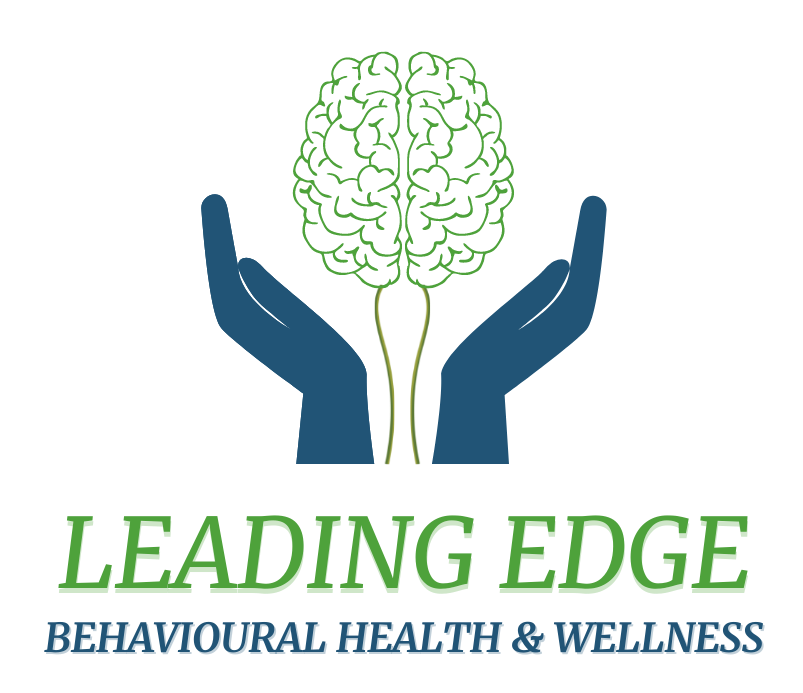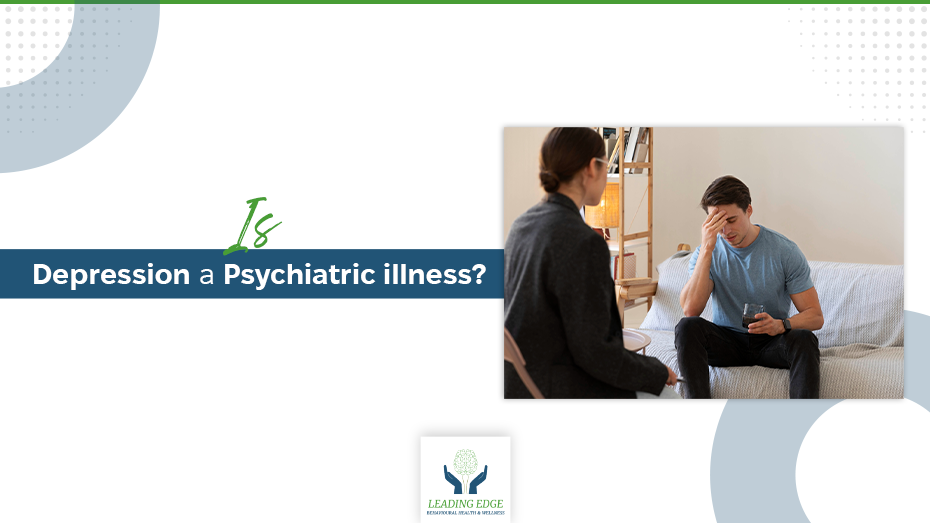We all face waves of sadness. Yet, what unfolds when those tides linger? When feelings stretch into weeks, months, or even years. Is depression just a bad mood, or is it a deeper shadow?
Let’s explore this question: “Is depression a psychiatric illness?”
We will break down what depression means, how it affects people, and why getting help matters.
Leading Edge Behavioral Health and Wellness is here for you if you’re struggling with depression. We provide personalized therapy to help you succeed. Reach out to us today!
What Is a Psychiatric Illness?
A psychiatric illness functions as a health issue that involves mental disorders. A mental disorder changes how a person sees things. It also impacts their feelings and actions. Health issues can make daily life more difficult. Common psychiatric illnesses are anxiety, bipolar disorder, and schizophrenia. But what about depression? Is it a psychiatric illness like these?
Yes. People should understand that depression exists beyond minor sadness. Doctors throughout the world consider this condition to be a severe medical issue. The condition changes the brain structure. It also disrupts sleep schedules and food intake, taking away the person’s energy. As with diabetes and heart disease, depression demands proper medical management.
The Many “Faces of Depression” (It’s Not One-Size-Fits-All!)
Each case of depression displays different manifestations among individuals. The multiple expressions of depression lead us to refer to it as the “faces of depression.” Look at depression as if it were a chameleon because it presents itself through various discrete methods.
For example:
- One person might always feel super tired, even after sleeping 10 hours.
- Another might snap at friends over tiny things, like spilled cereal.
- Someone else could lose interest in hobbies they used to love (RIP, video game marathons).
Depression affects everyone, regardless of age. It brings feelings of loneliness, anger, or emptiness. Sometimes, people mask it with a smile. That’s why understanding the faces of depression is so important!
Depression Isn’t Just “In Your Head”—Your Body Feels It Too!
Here’s a strange fact: depression can cause physical symptoms. It sounds odd, but it’s true! Depression and vomiting may not seem linked. Still, the stress from depression can upset your stomach. Think of it like this: your brain and gut are BFFs. If one’s struggling, the other might freak out, too!
Other fun (not really) physical signs include:
- Headaches that won’t quit
- Muscle aches, like you ran a marathon (but you didn’t)
- Eating way more—or way less—than usual
So, if someone says, “It’s all in your head,” you can politely tell them, “Actually, my whole body is involved, thanks!”
Why Does Depression Happen?
Depression has many parts that create a tough challenge.
- Genetics: The risk of experiencing it increases when it occurs in your family background.
- Brain Chemistry: Your brain needs serotonin and dopamine, and like cake, it needs sugar. Without them, it won’t rise properly.
- Difficult Life Events: Trauma, heartbreak, bullying, and financial woes can ignite the flames of depression.
Imagine a backpack full of weight. One rock stands for school stress, while another symbolizes family issues. Each additional stone tips the scale of your spirit. Collectively, they illustrate how heavy times can lead to depression’s shadow.
The Goal of Depression Treatment: What’s the Point?
Treating depression means helping you feel better, not fixing what isn’t broken.
Here’s what treatment may include:
- Therapy: Talking with a counselor helps clear up messy thoughts.
- Medication: Antidepressants balance the brain chemicals we discussed.
- Changes to Daily Living: Be active, sleep well, and eat healthy foods (vegetables are essential!).
Think of it as learning a new skill. At first, you need help, like guidance or resources. Then, you will become independent!
Reasons to Seek Therapy (No, It’s Not Just for “Crazy People”!)
Therapy isn’t just for the “serious” stuff. Everyone can use it as a resource! Here’s why you might consider diving into therapy:
-
You’re Not Alone
Therapists understand your struggles. They have helped many, so there is no judgment!
-
Learn Helpful Coping Skills
Think of therapy as a toolbox for managing stress.
-
Stop Small Problems from Growing
It’s like patching a tiny leak before a deluge descends. Everyone needs assistance. Therapists are available to help.
How to Help a Friend (Without Being Awkward)
Here’s how to help a loved one who feels down without being awkward:
-
Listen Intently
Offer, “I’m here for you,” instead of “just cheer up!”
-
Suggest Professional Support
Help them locate a therapist.
-
Stay Calm
Be patient because recovery takes time. It’s similar to anticipating your favorite show’s next season.
Sending entertaining memes and sharing dinner with someone significantly impact daily life.
Depression vs. “Normal Sadness”: What’s the Difference?
Everyone feels sad now and then. Sadness can lead to longer-lasting depression. Here’s a comparison to clarify the differences:
- Sadness: You cry after a sad movie, then feel better with pizza.
- Depression: You cry all the time, and pizza doesn’t help at all.
If low moods last for weeks and affect school, work, or friendships, ask for help.
Final Response: Is Depression a Psychiatric Illness?
Yes! Depression is a real psychiatric illness, but it can be managed. Millions of hearts have found relief through therapy, medication, and lifestyle changes. With the right tools, even the heaviest fog can lift. Embrace the journey—it’s one worth taking.
You should remember:
- Depression manifests in many different faces (it’s sneaky like that!).
- The physical symptoms of depression are real and valid. They include fatigue and vomiting.
- The goal of treating your depression is for you to feel normal again.
If you are ever going through a rough patch in life, hold on; help exists, and you deserve it.
FAQ
Do medicines change your personality?
A: No! They help your brain feel balanced, like fixing a wobbly table.
Is it okay to ask for help for minor problems?
A: Yes! It’s better to fix a tiny leak before it floods the house.


